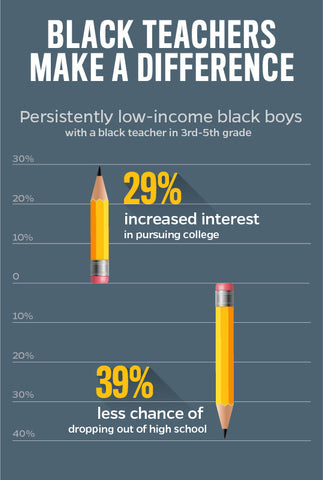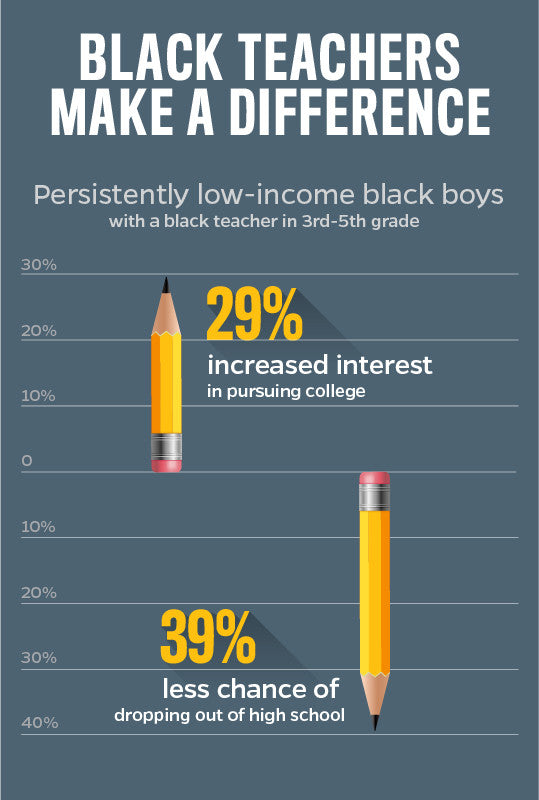Greg Stanley/Johns Hopkins University

Low-income black students who have at least one black teacher in elementary school are significantly more likely to graduate high school and consider attending college, concludes a new study co-authored by a Johns Hopkins University economist.
Having at least one black teacher in third through fifth grades reduced a black student’s probability of dropping out of school by 29 percent, the study found. For very low-income black boys, the results are even greater – their chance of dropping out fell 39 percent.
Previous research has shown there are short-term benefits to pairing students with teachers of the same race, but this study, a new working paper published by the Institute of Labor Economics, demonstrates the positive impacts of having just one of these teachers can continue over many years.
“Black students matched to black teachers have been shown to have higher test scores but we wanted to know if these student-teacher racial matches had longer-lasting benefits. We found the answer is a resounding yes,” said co-author Nicholas Papageorge of Johns Hopkins. “We’re seeing spending just one year with a teacher of the same race can move the dial on one of the most frustratingly persistent gaps in educational attainment — that of low-income black boys. It not only moves the dial, it moves the dial in a powerful way.”
The researchers initially studied about 100,000 black students who entered third grade in North Carolina Public Schools between 2001 and 2005. About 13 percent of the students ended up dropping out of high school, while about half graduated, but with no plans to pursue college.
However, low-income black students who were as good as randomly assigned to least one black teacher in third, fourth or fifth grade, were not only less likely to drop out of school, but 18 percent more likely to express interest in college when they graduated. And persistently low-income black boys — those who got free or reduced-price lunches throughout primary school — who had at least one black teacher in third, fourth or fifth grade, were 29 percent more likely to say they were considering college.
Having more than one black teacher improved outcomes for these students, but not significantly more than having just one, the researchers found. About half the pool of students ended up having at least one black teacher in grades three to five.
The researchers replicated their findings by looking at black students in Tennessee who entered kindergarten in the late 1980s and participated in the Project STAR class-size reduction experiment. There, they found that students who had at least one black teacher in kindergarten through grade three were 15 percent less likely to drop out. Having at least one black teacher in those grades also increased a student’s chances of taking a college entrance exam by 10 percent.
This “race match effect” is sometimes called “the role model effect,” a term that gets at why the researchers think a stint with a black teacher can be so lastingly beneficial for black students.
Papageorge calls it “a story about the power of expectations and the way people make investments in themselves.” In a study published last year, Papageorge and co-authors found that a race played a big part in how teachers judged a student’s abilities. When a black teacher and a white teacher looked at the same black student, the white teacher was about 40 percent less likely to predict the student would finish high school.
“If having a teacher with high expectations for you matters in high school, imagine how much it matters in the third grade,” Papageorge said. “Many of these kids can’t imagine being an educated person and perhaps that’s because they’ve never seen one that looks like them. Then, they get to spend a whole year with one. This one black teacher can change a student’s entire future outlook.”
Next the team would like to see if the benefits of teacher race matching last even longer, by looking at college completion rates and income data.
In the meantime, Papageorge hopes school policymakers consider how they could change a student’s chance at success by getting him into a classroom with a teacher of the same race.
“This isn’t a situation where students need two, three or four black teachers to make a difference. This could be implementable tomorrow,” he said. “You could literally go into a school right now and switch around the rosters so that every black child gets to face a black teacher.”
The research team included Seth Gershenson, an assistant professor of public policy at American University; Cassandra M. D. Hart of University of California, Davis; and Constance A. Lindsay of American University.
###
Johns Hopkins University news releases are available online, as is information for reporters. To arrange a video or audio interview with a Johns Hopkins expert, contact a media representative listed above or visit our studio web page. Find more Johns Hopkins stories on the Hub.

